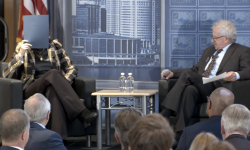As Michigan coronavirus cases slow, Gov. Whitmer eyes reopening economy

April 24 update: Gov. Gretchen Whitmer expected to extend stay-home order until May 15
April 17 update: Whitmer to begin laying out economic plan next week
Coronavirus cases in Michigan appear to be plateauing and talks are underway to eventually lift the lockdown and reopen the state, Gov. Gretchen Whitmer said Monday.
That’s welcome news for a state hammered by the pandemic, especially in southeast Michigan, which is fourth in the nation with 25,635 cases. Overall, 1,602 have died statewide from the virus as of Monday.
Since April 3, when the state reported nearly 2,000 new cases, new positive cases have gradually declined. Michigan reported 997 new cases on Monday.
- The latest: Michigan coronavirus map, locations, updated COVID-19 news
- What Michigan's new coronavirus stay-at-home executive order means
- When Michigan unemployment, stimulus checks, and $600 CARES money will arrive
“These numbers give us reason to have some cautious optimism that the rate of increase is appearing to slow down,” Whitmer said during a news conference on Monday.
“I say cautiously optimistic because … this is a snapshot and we need a lot more data to determine if this is a trend.”
Michigan’s lockdown has closed businesses statewide and led more than 1 million people — a quarter of the state’s workforce — to file for unemployment.
Whitmer said sustaining the plateau of COVID-19 cases is one factor that will inform her decision on reopening the state’s economy. Michigan also needs to ramp up testing and hospitals must have the resources to handle remaining cases, Whitmer said.
State officials are developing a plan to safely ease stay-home restrictions that have been in place since March 24, Whitmer said, adding the plan will likely be rolled out in phases.
“We need to get this right,” she said. “It’s going to be a data-driven approach based on facts, based on science, based on recommendations from experts, epidemiologists and economists.”
Easing up too soon could bring a second wave of cases and deaths, said Dr. Joneigh Khaldun, the state’s chief medical executive. During the 1918 flu pandemic, cities that lifted restrictions too early ultimately had slower economic and public health recoveries, she said.
"Easing up on social distancing measures too soon will be devastating," Khaldun said. "A lot more people will die and our hospital systems will get overwhelmed."
And while there are “early signs of a plateau in the rate of growth,” Khaldun said, there are still “many new cases and deaths every day” and an increase in case rates in areas including Genesee County.
People who are temporarily out of work due to the closures are increasingly turning to the state for help, said Jeff Donofrio, director of the Department of Labor and Economic Opportunity.
Michigan has the highest number of unemployment claims in the Great Lakes region and the third-highest number in the country, behind only California and Pennsylvania.
The influx has overloaded the state’s unemployment filing system, crashing the website multiple times, including on Monday morning.
“We are committed to making sure that every eligible Michigander who needs unemployment insurance benefits will get them,” Donofrio said, adding the state has increased staffing and invested in server capacity to try to keep up with demand.
Whitmer acknowledged widespread frustration with the state lockdown and restrictions on gardening, boating and other activities, but assured residents their end is “on the horizon.”
“We will get past this,” she said. “This is not a permanent moment.”
RESOURCES:
- Hey, Michigan, here’s how to make a face mask to fight coronavirus
- Michigan coronavirus dashboard: cases, deaths and maps
- Michigan families can get food, cash, internet during coronavirus crisis
- How to give blood in Michigan during the coronavirus crisis
- 10 ways you can help Michigan hospital workers right now
- Michigan coronavirus Q&A: Reader questions answered
- How to apply for Michigan unemployment benefits amid coronavirus crisis
See what new members are saying about why they donated to Bridge Michigan:
- “In order for this information to be accurate and unbiased it must be underwritten by its readers, not by special interests.” - Larry S.
- “Not many other media sources report on the topics Bridge does.” - Susan B.
- “Your journalism is outstanding and rare these days.” - Mark S.
If you want to ensure the future of nonpartisan, nonprofit Michigan journalism, please become a member today. You, too, will be asked why you donated and maybe we'll feature your quote next time!




